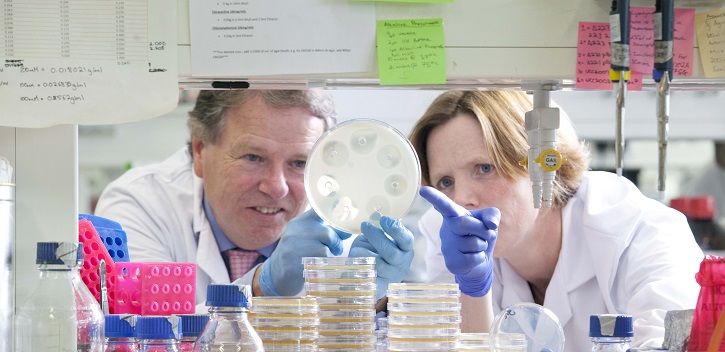APC Microbiome Institute at UCC creates 50 new jobs

APC, the national centre for excellence in food and medicine research at UCC, announced today (August 28) the creation of 50 additional hi-tech jobs in Cork.
- 50 new jobs created as APC is designated a national Institute in Cork
- Growth driven by industrial partnerships leveraged from Science Foundation Ireland (SFI) funding
- Top scientists gather in UCC to discuss Missing Microbes and Modern Maladies
The new jobs have arisen largely from the capacity of APC to attract new industrial partnerships. Commenting on this achievement, Minister for Agriculture, Food, the Marine and Defence, Mr Simon Coveney TD, said “these 50 jobs come on top of the 90 existing positions in the APC.” Minister Coveney was speaking at the formal launch of the APC Microbiome Institute at University College Cork today. He continued “Government policy is directed at funding research and development to create high-tech job opportunities, and APC is to be commended for the fact that it is now providing direct employment for 140 researchers.”
Professor Fergus Shanahan, Director of the APC Microbiome Institute stated that “We now partner with 8 global corporations with a broad footprint in Ireland accounting for in excess of 7,000 jobs. In addition, APC has established partnerships with 9 international companies with no prior relationship with Ireland. The current vision for enterprise policy in Ireland is that research partnerships would encourage multinational companies to locate in Ireland. The APC, founded in 2003, and today designated a national institute, is delighted to be at the vanguard in delivering on this national ambition.” He continued “APC is bringing tangible benefits to society by contributing to our understanding of the importance of microbes in human health and developing our researchers’ talents.”
Speaking at the formal launch of the APC Microbiome Institute in UCC on Friday August 28th 2015, UCC President, Dr Michael Murphy stated “The APC has not only delivered on its ambition, but has surpassed all expectations. To underpin its future growth and sustainability, UCC is now committing to the establishment of the APC as a national institute at the University. ”
To mark the occasion of the launch, Dr Martin Blaser, an infectious disease specialist and author of the worldwide best-selling book “Missing Microbes” will deliver the inaugural APC Distinguished Lecture. Drawing from his contributions to the understanding of many infectious diseases, he will explain the beneficial role played by bacteria in human life. A symposium “Missing Microbes and Modern Maladies “ will showcase the research of the APC Microbiome Institute including the role of diet at the extremes of life, the influence of stress on microbes in the gut and the development of future foods and smart antibiotics.
ENDS
About the APC Microbiome Institute at UCC
The APC in Cork is one of Science Foundation Ireland’s national centres for research and it represents a partnership between UCC, Teagasc and CIT. Since its foundation in 2003 it has made several seminal contributions to the field and was ranked second in the world by Thomson Reuters for its area of science. In recognition of the significantly increased scale of APC activities and the importance of microbes in health, UCC has recognised the Cork scientists with the designation of institute. The APC formerly known as Alimentary Pharmabiotic Centre will now be named APC Microbiome Institute.
APC has recently announced new partnerships with Janssen Biotech, Second Genome and 4D Pharma. These are in addition to the 12 companies that APC already partners with from national and international food, pharmaceutical, and diagnostic sectors, including Kerry, Alimentary Health, GE Healthcare and Sigmoid Pharma.
Human existence depends on bacteria. Now doctors and scientists believe that most of the diseases of modern civilisation are due in part to a change in the microbes (bacteria and viruses) living in and on the human body. In particular, there has been a reduction in the diversity of microbes in our body and a complete loss of many species. This change has occurred in recent decades and has accompanied the alterations in lifestyle that accompany socioeconomic development. The most profound influence of modernisation is the impact of diet and antibiotics on the microbial residents within the human gut. Other influences include changes in prevalence of breast feeding, mode of birth (Caesarian or natural), and urbanisation. Scientists are now establishing that there are causal links between these changes and the increased incidence of obesity, diabetes, allergies and chronic inflammatory diseases.
